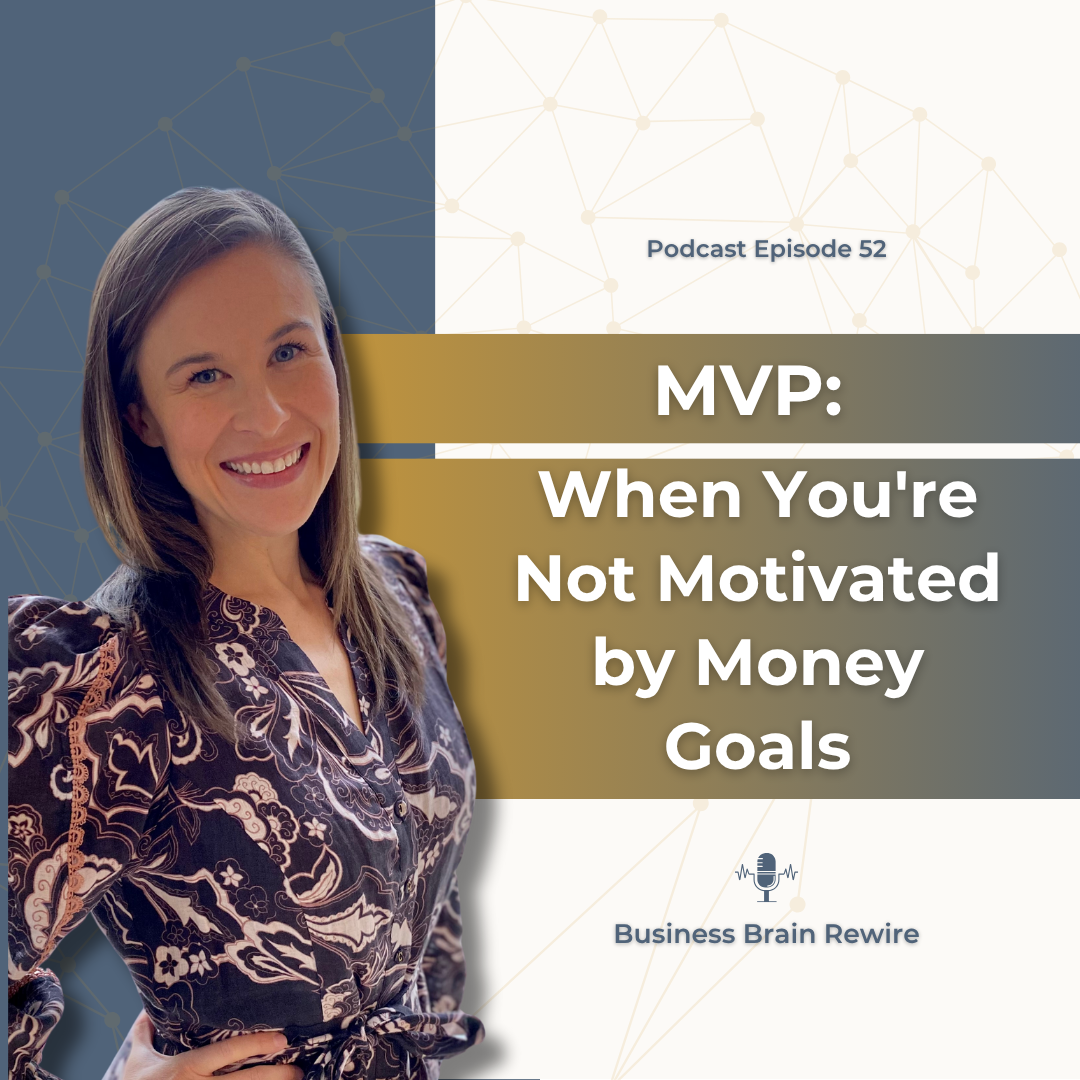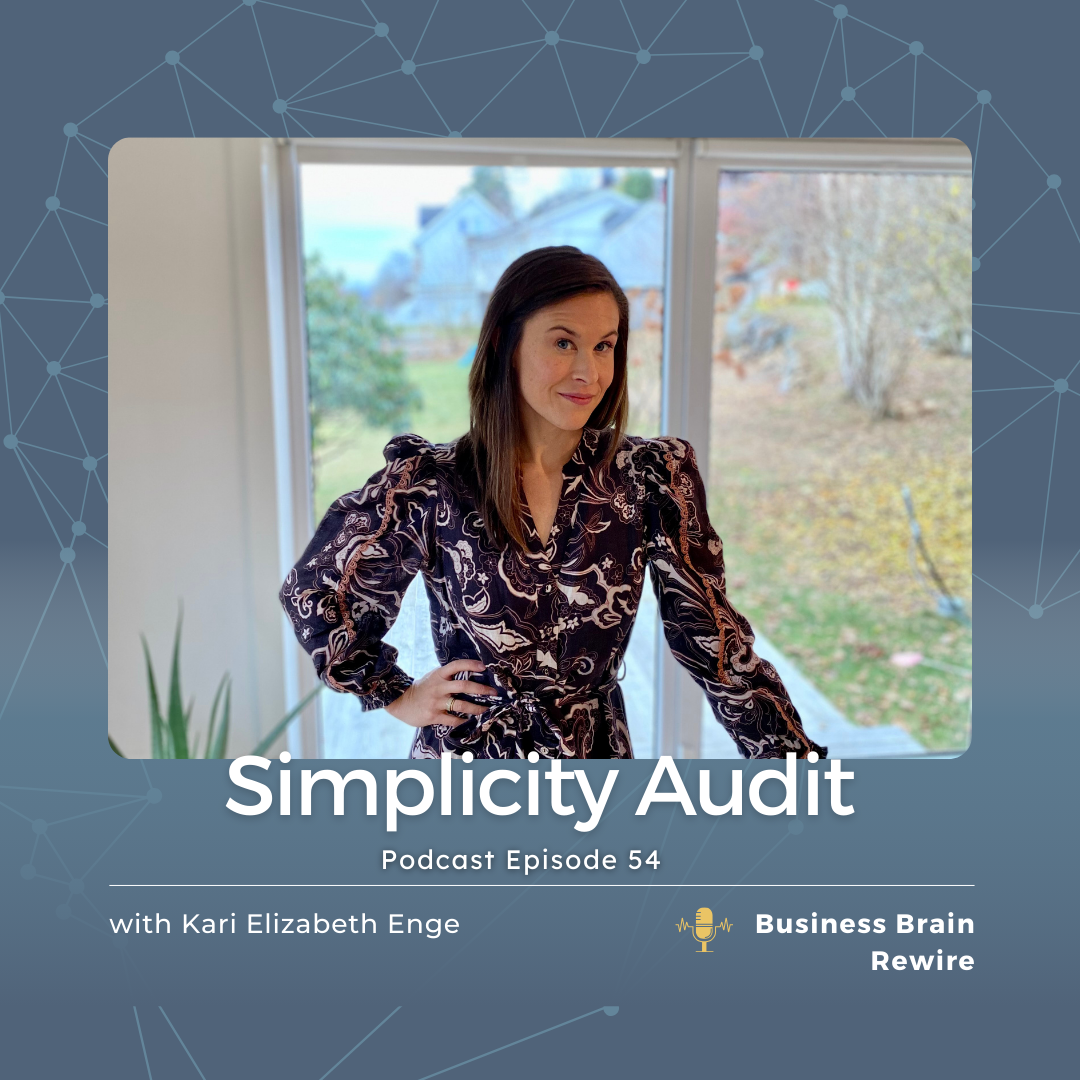Many purpose-driven entrepreneurs are not motivated by money. Because they want to be purpose-driven. And because money does not always equal social impact in their minds.
Today, I’ll share why not having a money goal is a red flag for deeper issues and why it’s important that you set a very specific revenue goal for your purpose-driven business each year in order to expand your social impact fully.
Money is truly the gateway for impact. Let’s get you more of it in today’s episode.
In this episode, you’ll learn:
- The deeper issues that you probably face if you are not motivated by money goals
- Why money goals are important for all entrepreneurs, even purpose-driven ones
- What a money goal does for your internal motivation so you can create a bigger impact
Important Links from Today’s Episode:
Want to increase your income and your impact without sacrificing your personal life or sense of wellbeing? Reach out and book a free consultation with me here.
Transcript
[00:06:54] Before we dive in, I’ll also want to mention that most of us, including me, okay, do have some room, some areas that we could improve on, meaning we could become even more healthy, even more abundant in terms of how we think about money. I’m not here to add shame or to make you judge yourself or look down on yourself or make you go into a lot of negative self-talk when it comes to where you are at with money and with goal setting. My intention today is just to get you to have more awareness around where you currently stand and just to give you some insights so that maybe you can step into new beliefs that will be help more helpful to you and healthier to you as you grow your business.
[00:07:46] It’s very common for entrepreneurs in the social impact space to say that they are more motivated by impact than they are by money, and that’s totally okay. On the surface, if we are just looking at, you know, that statement, as just a blank statement, surface level, and we’re not adding any meaning to that, there’s nothing wrong with being a person who is driven and motivated to make a positive difference in the world over having money in the bank account. All right? I think that’s actually a really great thing, right? If you just wanted to gather money into a bank account instead of making a difference in the world, then I would question whether or not you actually are a purpose-driven entrepreneur.
[00:08:32] However, I want you to understand that money doesn’t carry any meaning on its own, okay? Money doesn’t mean anything until we give it meaning by what we use it for and why we use it. All right, so money is just a symbol, right? We assign meaning to it. Like the paper or the coin or the number that you see in the account that actually is not positive or negative. Okay? So I think it’s important for you to just be reminded that money is not good or bad. Money is not positive or negative. Money is not greedy or generous. Money is not impactful or destructive on its own. Money has no meaning on its own. It’s only what we do with it and then what we make that mean that then translates to money meaning something. Alright. So when entrepreneurs are not motivated by money, they are just probably thinking about money as the paper, as the coin, as the amount in the account. They’re thinking about just acquiring it or holding it. They’re not thinking about how they will use it and what that can mean for them. Otherwise, money would be way more motivating than it currently is.
[00:10:05] All right, so if you, for example, bring in, let’s say, 50,000 more dollars in revenue into your business next year versus this year, just acquiring $50,000 and having it sit in the account or acquiring that and spending it on something that’s not important to you based on your own thinking and your own priorities and your own values, that might not feel motivating to you, right? Because of your desire to create an impact over everything else. But I think you’re missing the point a little bit because again, money doesn’t mean anything. You assign the meaning to it. You can use money to make a huge impact in the world. In fact, you can’t do that without money. Right? You literally will not be able to get anywhere. You need to be able to hire people. You need to be able to create things. You need to be able to fund your programs. You need to be able to put food on the table for yourself. You need to be able to enjoy life and to bring abundance into the world. You need to be able to do those things.
[00:11:23] So by you saying that you aren’t motivated by that, I want you to just question it because the idea of creating more impact in the world should be super motivating to you, and money’s the only way you’re gonna be able to accomplish it. I also want you to think about the fact that: what would it mean if you were motivated by money? A lot of you make that mean something terrible about you, right? If you were motivated by money, then that would make you a greedy capitalist. Or if you were motivated by money, you wouldn’t be a social impact entrepreneur, right? You feel a lot better about yourself when you can say, I’m not motivated by money.
[00:12:05] But I want us to start having a conversation around purpose-driven entrepreneurs being empowered by money and not playing this game like it’s one or the other, or one over the other. Because money and impact are actually the same thing. Sales and impact are actually the same thing if we’re honest with ourselves, right? Because. You can’t have one without the other. I also wanna speak specifically right now to my fellow female entrepreneur, right? If you’re another woman listening, I want you to know that systemically, I guess that’s the right word, in historically, we have not been empowered or even allowed to acquire, hold, manage and use wealth to the extent that our male counterparts have. All right, so when we acquire money when we hold money, when we manage that money, and then when we spend it on things that are impactful in the world, that is actually a super positive thing for the world. Our societies are homes, they become better when women are empowered with wealth. We know this. Okay? If you struggle with the fact that maybe you will be greedy if you reach a certain level of income. Or you’ll be too busy to be a good mom if you reach a certain level. Or you’ll have too much responsibility that you won’t be able to handle, but you would totally feel okay if a man had that level of responsibility.
[00:13:44] For example, I just want you to become aware that those are some of the thoughts that you have, and to start to read up a little bit, right? Look at the scientific research, the studies that have been done, where we have seen that women acquiring and holding and managing and being empowered with money is so good for society and for our communities. Okay? So I want you to be a part of that. All right? I don’t want you to feel like you want all the other women to have the money, but you don’t want it to be you. Okay? I want you to feel super empowered by money because that’s impactful for both you and the world, and also just because you can and it’s fun and there’s nothing wrong with that. You should feel good being motivated by money as a purpose-driven entrepreneur.
[00:14:37] Okay, now I want to dive in deeper. I wanna talk about some of the reason, the other reasons why we might not be motivated by money. So I’ve already talked about the fact that I. I think that we shouldn’t be motivated by money because it means we are greedy or capitalists or not purpose driven, or maybe it doesn’t motivate us because we’ve never been empowered. We’ve never felt free to actually be motivated by money because maybe we’re a woman and systemically that’s not how we were raised. The third reason that I see entrepreneurs not being motivated by money needs to be discovered during a conversation. I kind of wanna paint the picture for you. All right. Maybe the entrepreneur is working with me and they come to our coaching session and they’re telling me their annual goals for their business. They have set some goals. They’ve set some things that they wanna accomplish for the year, but they haven’t set a revenue goal or a sales goal for their business. When I ask them why they’ve resist that sales or revenue goal. They tell me I’m just not motivated by money goals. They don’t work for me. I’ve seen in the past that I’m just not motivated by them. So I don’t really set those kind of goals. I set other goals. I set intentions, or I use a word of the year or something like a little less specific and a little less tangible in terms of I make this number of sales this year and I bring in this number of dollars. Right? I always like to dig deeper with them and investigate beneath the surface, because for me, that’s just a little red flag. Maybe red is the wrong word because, you know, I don’t want the you or the entrepreneur to feel like I’m telling you that you’re broken or we need to fix you or anything. But it’s just a sign like signpost for me that there might be some money mindset things that this entrepreneur has that are blocking her from the growth that she could have, and maybe she’s unaware of it. Maybe we need to uncover those and get her to a more abundant, healthy place. I’ll start to ask why don’t you like money goals? Why don’t they work for you? And oftentimes the entrepreneur will come back and say, if I say that I’m gonna make this amount of sales and I’m gonna get this number of dollars in revenue this year, then I feel a lot of pressure and things start to feel super heavy and not fun anymore.
[00:17:06] So then I asked them, okay, well, what happened in the past? Have you ever experienced that in the past where you set a money goal and then you had pressure and then it became not fun? Explain that to me. Tell me what happened. Oftentimes, what happened is that the entrepreneur didn’t reach a revenue goal in the past. They didn’t reach a sales target. They set for themselves, and they had a lot of negative emotion, right? They felt like a failure. They felt hopeless. They felt sad. They felt disappointed. When they didn’t reach that goal, they made that mean a lot of things about them as an entrepreneur, right? That they weren’t gonna be successful, that this business wasn’t gonna work, that they were bad at sales, that they weren’t organized, that they weren’t money people. They actually inflicted like all this punishment on themselves from their self-talk after they didn’t reach the revenue or the sales goal. So I want you to think about that for a second. Okay.
[00:18:10] The entrepreneur is saying they’re not motivated by money now, and they’ve had a negative experience in the past be when they didn’t reach the goal related to money. This shows me that the entrepreneur doesn’t like money goals because they think they’re gonna fail again. They don’t think that they can reach a goal in the future, right? Because if they were a hundred percent with full confidence that they would reach a revenue goal, they set for themselves, or they would reach a sales goal, they set for themselves, why wouldn’t they set it, right? There would be nothing to lose. There wouldn’t be any resistance because there would only be something to gain, right? They would go out and they’d reach it, and then they’d feel positive. They would only feel negative about themselves, or they would only feel like things were heavy or not fun or there was a lot of pressure, if they didn’t think that they could reach the goal. And I’ve seen time and time again after we dig deeper and we find the reasons why they don’t like money goals, we find that the entrepreneur doesn’t wanna set them because they think they’ll fail, and then they, their brain knows what happens when they don’t reach the money goal. Right? The self-inflicted self-talk and negative emotion is part of the picture.
[00:19:35] Okay, so if you don’t wanna set a revenue goal for yourself, a specific one, I want you to just ask yourself, is it because I don’t think that I can do it? Is it because there’s a slight chance that I’m not gonna reach this? There’s a slight chance that I might fail, and then i’m gonna treat myself terribly, and I’m gonna make that mean that I’m not gonna be successful. I’m not good at sales. I’m not a good business person. This business isn’t working. I don’t know what I’m doing. Or along the way, the entrepreneur’s gonna make the goal so heavy, right? They’re going to attach so much meaning to reaching the goal because they’re making, reaching the goal means something about them, and then they’re hussy to get there because they have to reach it in order to think about themselves a certain way or feel a certain way. They don’t wanna be disappointed when they don’t reach it, because that will mean something about them. They just say, no, that’s just too much pressure. That’s too heavy. That’s not fun. I’m not gonna set the revenue goal because it’s not motivating for me. Alright? But that’s not an empowered place to be because it’s really important that you bring in money and bring bringing sales into your business. We need a target that we can set our eyes onto in order to help us make the best decisions for our business.
[00:20:59] Okay, so the last reason why entrepreneurs make money not motivating that I want to talk to you about, before I then talk about why money goals are incredibly important and how we use them. I wanna talk about the last reason because sometimes entrepreneurs don’t want to set a revenue goal for their business or a sales target for their business because it triggers some insecurity or some thoughts or worries they have about what that level of business or that size of business will mean, right? Again, they’re attaching meaning to things and then they are getting stressed out about it.
[00:21:40] For example, maybe if you reach a certain revenue amount or a certain number of sales, or a certain number of customers that will maybe to you mean that you now have a huge responsibility on your hands? Maybe that will mean a more overhead. Maybe that will mean more risk, right? In your mind. You might have employees now, right? That you have to take care of. Or maybe that you think that your business will be more complex and there’ll be more logistics that you’ll have to sort through, or maybe you think it’ll mean less free time for you, less family time, less time for your sense of wellbeing and your health. The entrepreneur is like, no, no, no, I don’t wanna reach this next level because of how negative my business will become. I like how it is right now. I like how comfortable and balanced everything has been set up for me. If I grow to a certain level, then that will be become overbearing and not something I want. Now, most of the time the entrepreneur does not know that this is happening until we do a little exercise where I say, okay. Tell me at what point your business becomes stressful. Is it 50 K in revenue? A 100 K in revenue? 500 K in revenue? 1 million in revenue? 5 million in revenue*? We just keep laddering up until the entrepreneur feels the trigger in their mind and says, oh, yep, that feels super stressful and overwhelming for me. Then we’re able to pull it apart and find the things that they’ve made that size business mean. Right. Maybe the entrepreneur’s at that level, I’m gonna have to have employees. Or at that level, I’m gonna have to get a office space. Or I’m gonna have to work more hours and I’m not gonna be able to be a good mom or whatever. There’s some sort of story in the entrepreneur’s mind where they’re making a certain dollar amount means something negative and so therefore they shy away from the money goal, like setting the money goal in general, but they don’t even understand that this is why. Isn’t that so fascinating?
[00:23:53] I think this is a great exercise for you to do with yourself, right? Set different revenue amounts and set different number of sales and just find when it becomes stressful for you when the feeling changes from positive to negative and start to investigate why, and start to think about the story that you’re telling yourself around how you think your business needs to be run. Most of the time it’s not a fact, right? There are tons of ways to grow a business, and you get to make the rules. Oftentimes we can simplify and we can de-stress, and we can grow a really big business in a way that serves you. So, all of that is just a misunderstanding and a story that your brain currently has that it doesn’t need to have. So we can really open you up to feeling better about growing this year and in the years to come, no matter the level. Right?
[00:24:49] That’s the last sort of reason that I see. Of course there’s gonna be other ones, but that’s like really the main one that I want you to think about because it’s super sneaky. Oftentimes the entrepreneur, again doesn’t think they have a money issue when they don’t wanna set a money goal, but sometimes this is actually what’s lying beneath the surface. So it’s not necessarily money mindset work that they need to do, but rather what money will mean for their business,. And just feeling empowered to be the CEO and the decision maker, and to make decisions so that their business works for them. To really understand that that’s possible at every level.
[00:25:31] Now I want to talk about why money goals are so important, and why I think you should be motivated by them. Okay. For purpose-driven entrepreneurs, we cannot make an impact without money. I want you to understand that if you don’t feel motivated by money, that you are, in essence saying you are not motivated by impact. There are the exact same thing, and if you are not motivated by the dollar amount. It’s only because you are not giving it a super great meaning. I want you to reestablish what money means for you and to set a great definition for it. Understand exactly how you like to spend money, exactly how you use money to make a difference in the world and to make the world a better place, and then money can get super, super motivating for you. Okay. The other reason I like money goals for purpose-driven entrepreneurs is because it gives us a starting point for making meaningful sub goals. It gives us a really great way to make sure that we are actually doing things in our business that are needed.
[00:26:41] Okay. For example, a lot of times entrepreneurs will be like, okay, I wanna grow my business this year and I don’t wanna set a revenue goal ’cause that’s not motivating, but I wanna have this many speaking engagements and I wanna grow my newsletter to this many subscribers and I wanna get this many social media followers and I wanna be on this many podcasts. They’re like super fine with setting all of these other sub goals, but they won’t allow themselves to set the big goal. But we cannot ensure that those other efforts are even needed. We cannot even know if those efforts are going to lead anywhere, unless we start at the finish line and then work backwards. We need to know, okay, if you want to increase your revenue by a hundred K this next year, what do you think is required in order to get there? What infrastructure needs to be put into place? What decisions do you need to make? Do you need to spend your time differently? How much money do you need to invest in sales and marketing? These kind of decisions cannot be made unless you know how much you are increasing your business next year.
[00:27:48] I really would caution people from just setting goals without understanding how much they’re trying to grow their business. It’s also a really great tool for deciding how much you are going to stop at, right? I want you grow in a sustainable way. I would never want you to grow too quickly. So by setting a goal, you can say, okay, I know what we wanna get to, but we also know we’re not gonna go past that because our operation cannot support that. We are really committed to growing this business in a really simplified and efficient way. Where we don’t have a lot of overhead, right? We don’t have too many employees and we don’t take unnecessary risk. So we have to set the end game. We have to understand how much we’re growing our business, and that is how we actually can make good sub goals. So I really, really want everybody to have a revenue goal. I think it’s a fantastic tool, and again, it’s only not motivating for you if you are making it mean something negative, right?
[00:28:56] Let’s do a little bit of self-reflection and awareness. I want you today to ask yourself, what does money mean to me? What does it mean if I have it as a woman? What does it mean if I have it as a business owner? What does it mean if this comes into my business? What am I gonna use it for? What are my plans for using this money to make a positive impact? What does this money mean just sitting in the account, right? Like I want you to feel really empowered by money and to make it mean only positive because there’s no reason why it would mean anything negative to you as a purpose-driven person. That’s gonna be able to free yourself up to set a money goal so that you can then work backwards and create really solid sub-goals and plan out your activities for the whole year in a way that’s super efficient and simplified and is going to actually help you to reach the goal. I also want you to reflect on what I said about you not actually thinking you can reach the goal, and that being the reason why you don’t wanna set one. That’s a huge, huge thing that I want you to think about, right? Oftentimes that’s a big reason why we don’t wanna set a goal, is because we don’t wanna be disappointed when we don’t reach it, which means we don’t think we’re gonna reach it.
[00:30:19] I want you to know as we wrap up that, of course your brain is never gonna fully believe that you can reach a goal until you do. Goals will always feel uncomfortable and scary because we haven’t done it yet. That’s just how the human brain works. That’s how we are wired. So there’s nothing wrong with feeling super uncomfortable and a little nervous and a little like, oh my gosh, can I do this? There’s nothing wrong with that. When you set a goal, that’s a great sign. It means that you are growing yourself. It means that you’re striving for new things and you’re opening up yourself. To receiving a new level of abundance, both in terms of impact and income and there’s gonna be like some discomfort along the way, but you can totally handle that discomfort. That’s what growing a business is all about, right? And you can totally. Treat yourself nicely when you may not reach the goal, right? We don’t punish ourselves when we don’t reach goals. Okay? So maybe that’s a podcast topic for another day, but really reflect on that as well, right? Am I shying away from setting money goals, setting revenue goals? Because actually I don’t believe in myself and I never want you to be in a position to where you can’t use goal setting tools for your business as a really great tool because you don’t believe that you can do it, right?
[00:31:45] The first step to reaching any goal is acknowledging that we can in fact do it. That’s why making the goal and putting it down on paper is so important because you are telling yourself, I believe in myself enough to actually make this something I’m gonna go for this year. All right you guys. So I hope that this was super helpful for you. There’s so much to unpack when it comes to money and goals for purpose-driven entrepreneurs. I hope that this little insight that I shared with you today is going to help you as you head into the rest of this year. I hope that this helps you become more empowered and motivated by money because it’s what drives our impact. All right, you guys. Keep good. Keep giving. And I’ll see you in the next episode.
Podcast: Play in new window | Download







